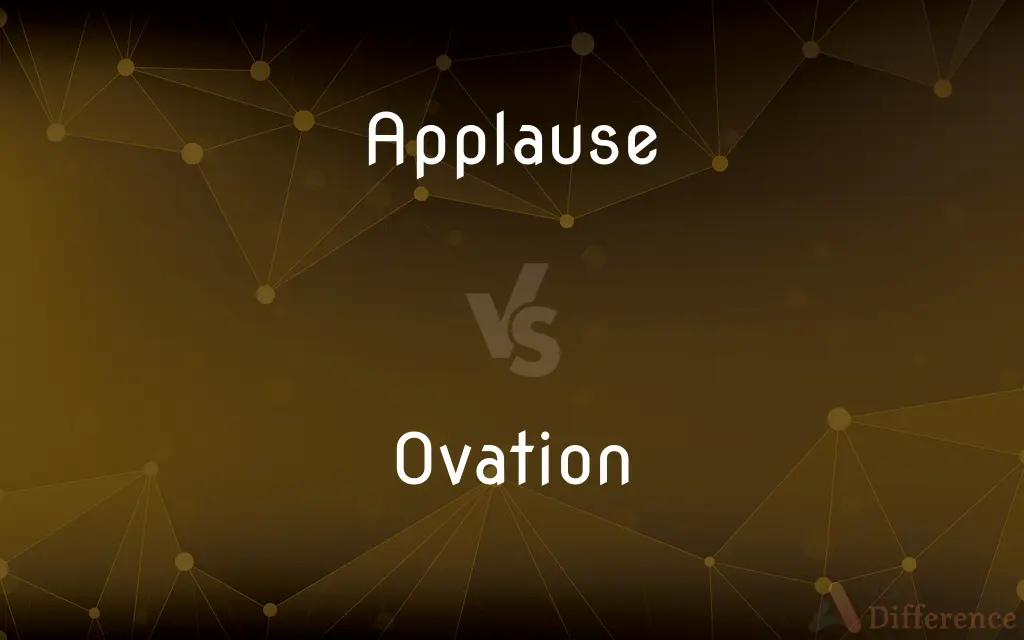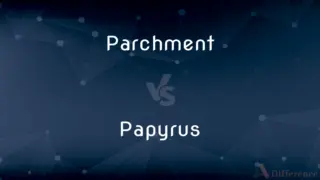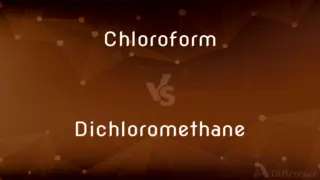Applause vs. Ovation — What's the Difference?
By Maham Liaqat & Urooj Arif — Updated on April 2, 2024
Applause is the act of clapping to show appreciation, typically in a moderate way, while an ovation is a form of applause that often involves standing and is more enthusiastic and prolonged.

Difference Between Applause and Ovation
Table of Contents
ADVERTISEMENT
Key Differences
Applause is a common form of showing approval or enjoyment, usually involving clapping hands together. It's a gesture often seen in theaters, after performances, or during speeches. On the other hand, an ovation is a step beyond simple applause, signifying a higher level of approval or admiration. Ovations can involve clapping, cheering, and often standing, reflecting a collective gesture of exceptional acclaim.
While applause can be given by individuals or groups and is a polite recognition of effort or achievement, ovations are typically given by larger groups and indicate a strong, shared enthusiasm for a performance or speaker. Ovations are less common and reserved for moments of extraordinary impact or appreciation.
The duration and intensity of applause can vary, but it generally remains a relatively restrained acknowledgment. In contrast, an ovation is characterized by its length and vigor, showcasing a more intense and passionate response from the audience.
The context in which applause and ovation are given also differs. Applause is appropriate in a wide range of situations, from casual to formal. Ovations, however, are often reserved for special occasions or for performances that move the audience deeply.
Comparison Chart
Definition
Clapping as a sign of approval or enjoyment.
Enthusiastic clapping, often standing, indicating high approval.
ADVERTISEMENT
Intensity
Moderate
High
Duration
Short to moderate
Long
Frequency
Common in various contexts
Less common, reserved for exceptional cases
Emotional Weight
Recognition of effort or achievement
Strong admiration and emotional response
Compare with Definitions
Applause
A common response to entertainment.
The play’s conclusion was met with enthusiastic applause.
Ovation
An enthusiastic and prolonged clapping.
The concert ended with an ovation from the fans.
Applause
A gesture of approval or praise.
The chef received applause for the meal.
Ovation
A form of applause where the audience stands.
The actor’s stunning performance earned a standing ovation.
Applause
Clapping of hands to show approval.
The performance ended, and the audience broke into applause.
Ovation
A rare and significant form of recognition.
Her groundbreaking research received an ovation at the conference.
Applause
A polite form of appreciation.
The lecture concluded to polite applause.
Ovation
A gesture indicating high level of approval.
The keynote speaker was greeted with an ovation.
Applause
Recognition of someone's effort publicly.
Her presentation earned her applause from colleagues.
Ovation
An expression of strong admiration or approval.
The reunion of the band was met with an ovation.
Applause
Applause (Latin applaudere, to strike upon, clap) is primarily a form of ovation or praise expressed by the act of clapping, or striking the palms of the hands together, in order to create noise. Audiences usually applaud after a performance, such as a musical concert, speech, or play, as a sign of enjoyment and approval.
Ovation
The ovation (Latin: ovatio from ovare: to rejoice) was a form of the Roman triumph. Ovations were granted when war was not declared between enemies on the level of nations or states; when an enemy was considered basely inferior (e.g., slaves, pirates); or when the general conflict was resolved with little or no danger to the army itself.The general celebrating the ovation did not enter the city on a biga, a chariot pulled by two white horses, as generals celebrating triumphs did, but instead rode on horseback in the toga praetexta of a magistrate.The honoured general also wore a wreath of myrtle (sacred to Venus) upon his brow, rather than the triumphal wreath of laurel.
Applause
Approval expressed especially by the clapping of hands.
Ovation
A sustained and enthusiastic show of appreciation from an audience, especially by means of applause
The performance received a thundering ovation
Applause
Praise; commendation
A scientific discovery that won critical applause.
Ovation
A processional entrance into Rome by a victorious commander, of lesser honour than a triumph.
Applause
The act of applauding; approbation and praise publicly expressed by the clapping of hands, stamping or tapping of the feet, acclamation, huzzas, or other means; marked commendation.
Ovation
Enthusiastic, prolonged applause.
Applause
The act of applauding; approbation and praise publicly expressed by clapping the hands, stamping or tapping with the feet, acclamation, huzzas, or other means; marked commendation.
The brave man seeks not popular applause.
Ovation
A show of public homage or welcome.
Applause
A demonstration of approval by clapping the hands together
Ovation
An ancient Roman victory ceremony of somewhat less importance than a triumph.
Ovation
(Ancient Rome) A victory ceremony of less importance than a triumph.
Ovation
(by extension) A (ceremony for the) recognition of some achievement.
Ovation
(by extension) Prolonged enthusiastic applause.
Ovation
The act of laying eggs.
Ovation
To give (someone) an ovation (prolonged enthusiastic applause).
Ovation
A lesser kind of triumph allowed to a commander for an easy, bloodless victory, or a victory over slaves.
Ovation
An expression of popular homage; the tribute of the multitude to a public favorite.
To rain an April of ovation roundTheir statues.
Ovation
A prolonged applause for a person of group after a speech or performance.
Ovation
Enthusiastic recognition (especially one accompanied by loud applause)
Common Curiosities
Is an ovation better than applause?
An ovation is considered a higher form of praise than applause, indicating stronger admiration or approval.
Is it rude to not participate in an ovation?
Not necessarily, but failing to stand during an ovation can be seen as a lack of enthusiasm or agreement with the majority’s sentiment.
Can you clap during an ovation?
Yes, clapping is a central part of an ovation, often accompanied by standing.
How long does an ovation last?
An ovation can last several minutes, depending on the audience's level of enthusiasm.
Do ovations only occur in artistic contexts?
While common in the arts, ovations can also happen in any setting where a performance or speech deeply moves the audience.
Can applause turn into an ovation?
Yes, if the applause is exceptionally enthusiastic and prolonged, it may evolve into an ovation.
Can you initiate an ovation?
Yes, an individual can start an ovation, but it requires the majority of the audience to join in to become genuine.
Is an ovation planned?
Ovations are spontaneous, arising out of the audience's overwhelming response to a performance or speaker.
Can a solo performance receive an ovation?
Absolutely, solo performances can and often do receive ovations for exceptional displays of talent.
Does the duration of the applause matter?
Yes, the duration of applause can reflect the audience's level of approval or enjoyment.
Is applause always polite?
Generally, yes, applause is a polite way to show appreciation, though its intensity and duration can vary.
Can applause be silent?
While applause typically involves sound, there are silent forms of applause, like the ASL clap, to show approval without noise.
How do performers react to ovations?
Performers often view ovations as a high honor, reflecting deep connection and appreciation from the audience.
What prompts an ovation?
Exceptional performances, speeches, or acts that deeply move or impress the audience can prompt an ovation.
Are standing ovations common in all cultures?
Standing ovations are common in many cultures but not universal; cultural norms around public displays of appreciation can vary.
Share Your Discovery

Previous Comparison
Parchment vs. Papyrus
Next Comparison
Chloroform vs. DichloromethaneAuthor Spotlight
Written by
Maham LiaqatCo-written by
Urooj ArifUrooj is a skilled content writer at Ask Difference, known for her exceptional ability to simplify complex topics into engaging and informative content. With a passion for research and a flair for clear, concise writing, she consistently delivers articles that resonate with our diverse audience.
















































